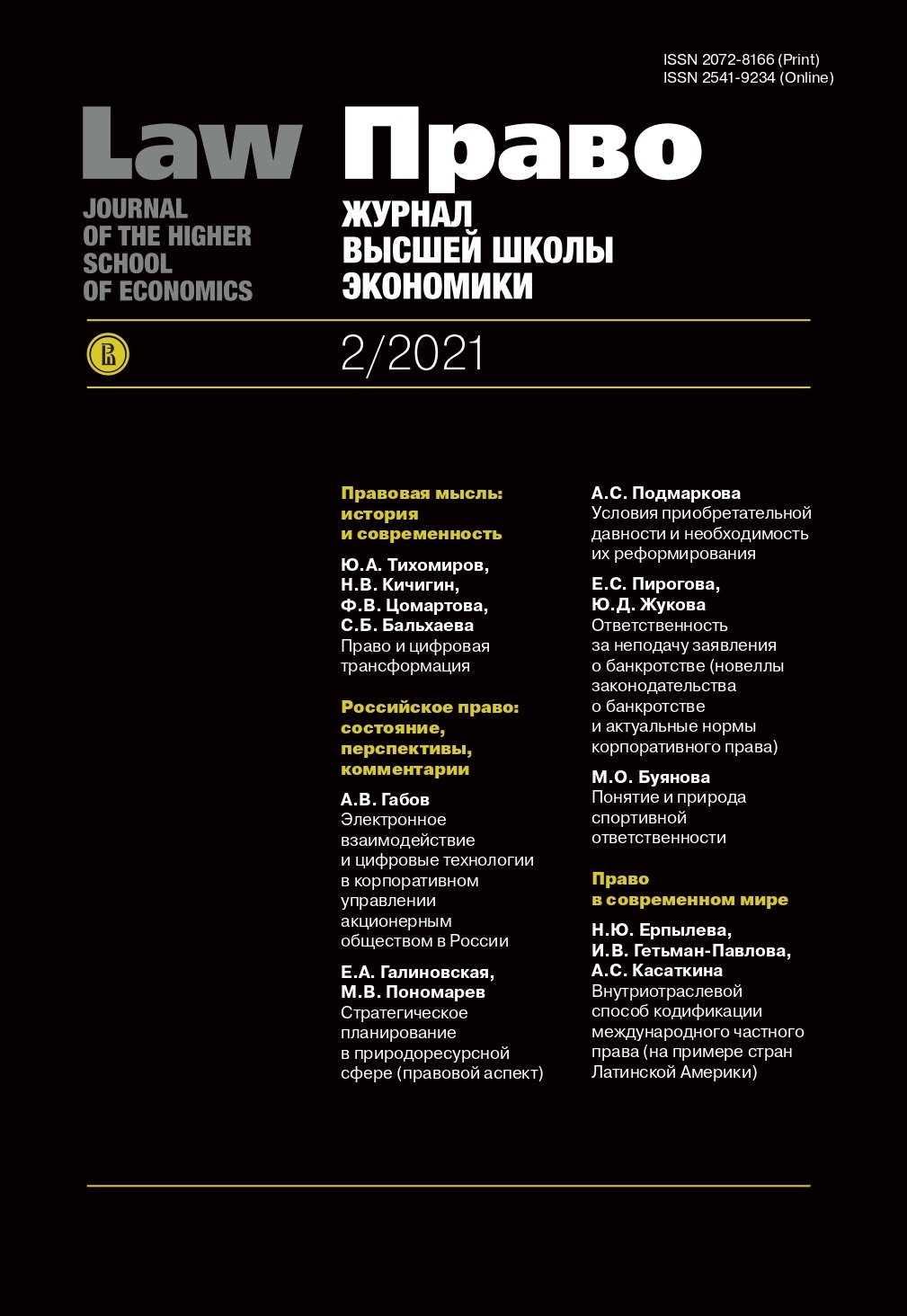Регулирование требований об убытках в Гражданском кодексе Российской Федерации и Принципах европейского контрактного и деликтного права
Аннотация
Целью настоящей работы является описание важных правовых граней главного вида имущественной ответственности (убытков) в сравнительно-правовом аспекте. Понятие ответственности является ключевым в науке гражданского права. Его универсальное значение заключается в монетизации чужих отрицательных имущественных последствий и возложении их финансовых результатов на причастного субъекта. В исследовании излагаются основные положения данного правового института в России и европейских странах. На заре цивилизации ответственность заключалась в реакции на несоблюдение правовых предписаний и выступала в виде штрафа, налагаемого в кратном от стоимости утраты размере. По мере развития общества денежная репрессия уже классифицировалась на гражданско- и уголовно-правовую, на являющуюся ответом на личную обиду и вызываемую неисполнением имущественных обязанностей — договорных и внедоговорных. Вместе с тем неустойка не всегда обеспечивала восстановление финансового состояния и одновременно создавала предпосылки для злоупотреблений. В итоге получил распространение другой способ защиты субъективных прав — возмещение убытков. Кроме того, в профессиональный обиход вошла правовая категория упущенной выгоды, как важный компонент убытков. В законодательстве был заложен механизм развития упомянутого инструмента, так как он определялся и как «будущие расходы на восстановление нарушенного права». К сожалению, этим активно не пользуются участники судебных процессов, а судьи пока не воспринимают такого широкого понимания возможных убытков. В исследовании получило отражение сопоставление отечественной и европейской концепций по этому поводу. Важным экономическим параметром постиндустриального общества, а также и основополагающим его критерием выступает структура валового внутреннего продукта с преобладающей долей услуг. Их производители несут более строгую гражданско-правовую ответственность, поскольку присуждаются к возмещению и за правомерный выход из договора с заказчиками, тогда как правовая традиция заключается в присуждении, только если лицо действовало неправомерно. В связи с этим в исследовании делается вывод о возрастании значения института убытков и его новой роли.
Литература
Baybak V.V. (2014) Causal relationship as a condition of contractual liability: comparative legal sketch. Vestnik Vysshego arbirazhnogo suda, no 6, pp. 4-21 (in Russian)
Baybak V.V. (2015) Loss of a chance as a type of contractual losses. Vestnik ekonomicheskogo pravosudia, no 5, pp. 63-73 (in Russian)
Benjamin P. (1960). Penalties, Liquidated Damages and Penal Clauses in Commercial Contract: A Comparative Study of English and Continental Law. International & Comparative Law Quarterly, issue 4, pp. 600-627.
Burrows A. (2017) Oxford Principles of English Law: English Private Law, A. Burrows, D. Feldman (eds.). 3rd ed. Oxford: University Press. 3104 p.
European Group on Tort Law (2005) Principles of European Tort Law: Text and Commentary. Vienna: Verlag Österreich. 282 p.
Egorov A.V., Usacheva K.A. (2013) Subsidiary liability for bringing to bankruptcy — an unsuccessful equivalent of the Western doctrine of lifting the corporate cover. Vestnik Vyssgegi arbitrazhnogo suda no 12, pp. 6-61 (in Russian)
Gutnikov O.V. (2016) Subsidiary liability in the legislation on legal entities: the need for reforms. Advokat, no 9, pp. 5-13 (in Russian)
Hesselink M. (2001) The Principles of European Contract Law: Some Choices Made by the Lando Commission. Global Jurist Frontiers, no 1, art. 4, pp. 5-95.
Komarov A. (2008) The Limitation of Contract Damages in Domestic Legal Systems and International Instruments. Contract Damages: Domestic and International Perspectives. D. Saidov and R. Cunnington (eds.). Oxford: Bloomsbury Publishing, pp. 245-264.
Koziol H. (2017) Harmonization and fundamental issues of European tort law (beginning). Vestnik grazhdanskogo prava, no 5, pp. 173-228 (in Russian)
Michaels R. (2014) The UNIDROIT Principles as Global Background Law. Available at: URL: https://ssrn.com/abstract=2502899 (accessed: 12.02.2020)
Nicholas B. (1992) The French Law of Contract. 2nd ed. Oxford: Clarendon. 292 p.
Perillo J. (1994) Unidroit Principles of International Commercial Contracts: the black letter text and a review. Fordham Law Review, no 2, pp. 281-344.
Sadikov O.N. (2009) Losses in the civil law of the Russian Federation. Moscow: Statut, 226 p. (in Russian)
Sadikov O.N. (2016) Model rules of European private law. Actual aspects of modern practice of international commercial turnover: collection of papers. Moscow: Statut, pp. 200-211 (in Russian)
Serakov V.V. (2016) Comparative legal analysis of the foreseeability of losses as a way to limit the amount of damage caused. Vestnik grazhdanskogo prava, no 4, pp. 159-184 (in Russian)
Copyright (c) 2021 Право. Журнал Высшей школы экономики

Это произведение доступно по лицензии Creative Commons «Attribution-ShareAlike» («Атрибуция — На тех же условиях») 4.0 Всемирная.


















